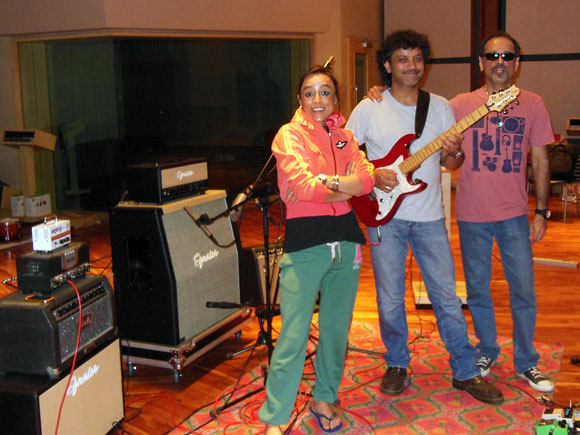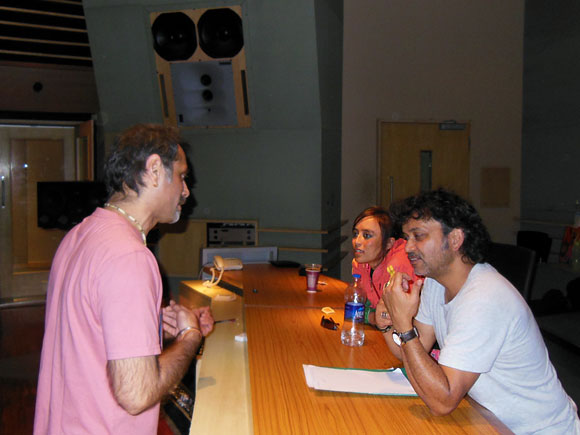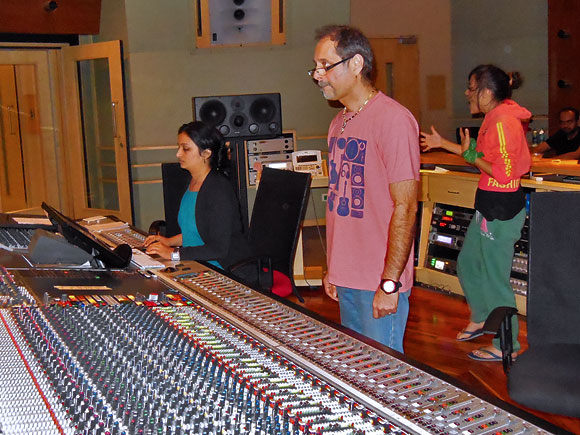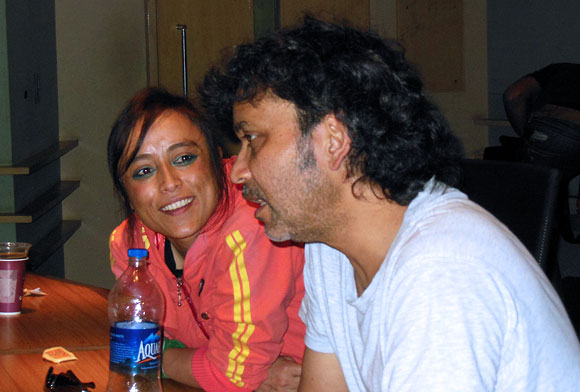 | « Back to article | Print this article |
India's blues stars Soulmate look back at a decade of change
Shillong-based blues band Soulmate, which in 10 years of performing has wowed legends like Carlos Santana and Buddy Guy, is recording its third studio album. Sumit Bhattacharya tunes in.
In the 1980s, as guitar player with Great Society from Shillong, one of India's best-loved early rock bands along with the likes of Waterfront in Mumbai and Calcutta's High, Rudy Wallang travelled across the northeast and beyond in an Ambassador. The gear – made-in-Guwahati guitars and home-made speakers – was strapped on top of the car, the drums in the boot, six people in the backseat.
Now, as leader of India's premier blues outfit Soulmate, Rudy, 50, is recording the band's third album – self-produced with a little help from friends – at Yash Raj Films' cavernous audio studio in Mumbai.
He and Tipriti 'Tips' Kharbangar, Soulmate's powerful, diminutive singer, have flown in with six guitars and the band and the equipment to "capture the energy of our live gigs" on record, as Rudy puts it.
Soulmate – Rudy on guitars, Tips on vocals and guitar, Rudy's son Leon on bass and Raveen Panday on keyboards – completes a decade this year. A decade in which it has wowed the likes of Carlos Santana – who jammed with them onstage and invited Tips and Rudy to perform with him – and Buddy Guy.
A decade in which India's contemporary music scene has transformed, with international acts making a beeline for the country, music festivals mushrooming, and live music clawing a comeback in the metro nightlife.
"I won't say it's booming," Rudy says, "but it's great right now. So we've taken the climb up that hill, so to speak."
India's blues stars Soulmate look back at a decade of change
How has the scene changed?
"Musicians now have access to better equipment, which equals better sound," says Rudy. "But then I find that a lot of them have become very lazy. Because they have not had to work to get their tone, their sound. With music it doesn't happen that way. A lot of these young fellows, they are really good technically – because now with the Internet and everything they can just sit there and practise and play and learn. But when you give them a guitar and an amp, they can't play. Because they depend (on their equipment)."
Rudy got his first proper guitar after 10 years of playing. "It taught me how to not depend on equipment," he says.
India's northeast hills have always been alive with the sound of music. But few bands have broken through to the national scene, and certainly none like Soulmate.
"I was lucky that we got to travel out," Rudy says. "There are really good bands there but they don't get to travel. It's nice to meet other musicians and learn. If we get stuck up in that little shell that we call the northeast and we feel bad about ourselves, that's not going to help in any way. We have to take that step out. Nothing will come to you. If you want something you have to go for it. So, we are trying to change the mindset of the young people over there. I guess to a certain extent they've seen Soulmate – 'Oh they've gone out there and done it,' so maybe they think, 'We can also do it.' And why not?"
Tips, dragged into an interview from dancing while Rudy records his guitar lines – "he is playing better because he can see me," she says – agrees.
"The northeast has really fine talents and the only sad part is that they're a little too far off," she says. "It's changing now for sure, and I'm glad that we're showing them the way... Many youngsters just want to copy what Western life is all about. We are just ourselves, and we enjoy what we do. That's the whole point. When you enjoy what you do, people will naturally enjoy to see what's pure."
India's blues stars Soulmate look back at a decade of change
When Soulmate played in Washington, DC in 2011, The Washington Post's article on Tips was headlined 'A tough, sexy blues singer at Kennedy Center India festival embodies country's rise.' Tips says she grew up a tomboy.
"Music has always been part of my life," she says. "I grew up in a neighbourhood metres from the church... That's our space of growing up. I come from a very conservative Christian family.
Sundays, you wake up at 6 in the morning and go for children's mass. Ten o clock, you go for Bible studies. One o clock, you go for the general Sunday mass. And evening you go for the house mass. Service, I should say, because I'm a Presbyterian. So it's always been church, church, church."
She became fed up of it and started to rebel.
"I would dress up differently – I'm more like a tomboy -- and they started complaining about me," she says. "I went for Bible class in my jeans! There was this old gentleman, a church leader, who said, (mimics preachy voice) 'Jeans are meant for boys.' I went back home and said, 'Mom I'm not going back to that church. They're complaining (about) what I'm wearing. God is not looking at my dress; he's looking at my heart!'"
As she grew older, she says, she "became a pretty notorious kid at home who would just break all boundaries."
India's blues stars Soulmate look back at a decade of change
She had three brothers, the eldest of whom she lost recently.
"Growing up in a house full of boys -- we would just wrestle all the time -- I became a boy," she says. "Until I met Rudy, I was still a boy!"
She adds: "He showed me the blues. And then, as I'm listening to the blues... the blues is so vast... You can be happy, sad, sexy, feeling fine, feeling alright... you gradually grow to that music."
Though she is being hailed as a blues mama, she grew up listening to a different kind of music.
"The '90s, what else," she says, grinning. "I was never shy, you know. They'd say 'Tips you wanna sing?' I'd say 'Ya'. That's always been me. They even called me the Sheryl Crow of Shillong. Then I sang Alanis (Morissette) and they called me the Alanis of Shillong! So funny, dude! I was just growing up, being a teenager. I'm really happy that I met Rudy and he changed my whole point of view about music... The blues has become part of my living. It's in me. This music is so pure and so true, man, you just can't fake it!"
They've hung out with legends they've worshipped and played across the world. And if they get enough online votes, Soulmate could go on to play at Eric Clapton's Crossroads guitar festival, due later this year in New York.
"I never would have believed it," Rudy says, laughing, talking about how things have gone for the band. Minutes earlier, he was describing sitting with Santana onstage behind the drums while Santana's wife Cindy Blackman played a drum solo. Tips had pointed to Rudy and told Santana, 'He's my man.' The guitar god pointed at Blackman, and said, 'She's my man.'
"I'm the same person I was when I started out," Rudy insists. "Just that my gear's got a little better, I'm sounding better."
Tips says Soulmate "was god-sent. Being with this band is like my family. The blues is my prayer; my everyday prayer. I feel blessed to be able to pray and get paid!"



